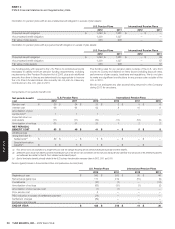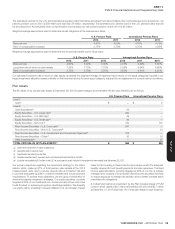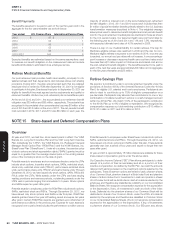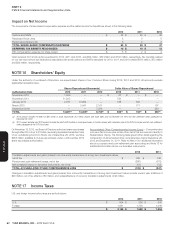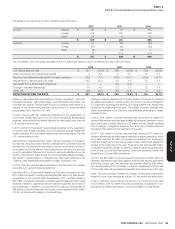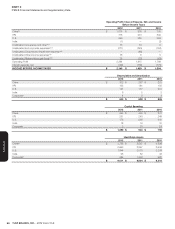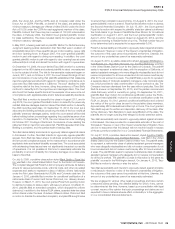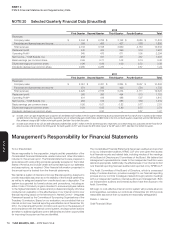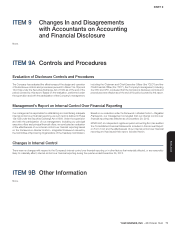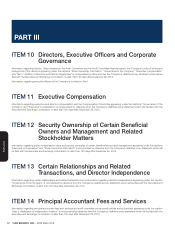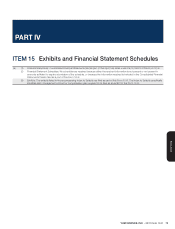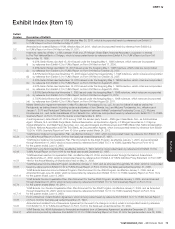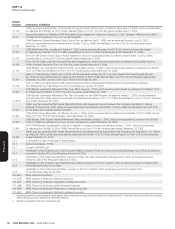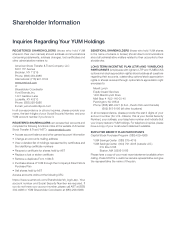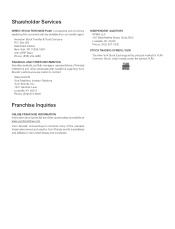Pizza Hut 2012 Annual Report Download - page 160
Download and view the complete annual report
Please find page 160 of the 2012 Pizza Hut annual report below. You can navigate through the pages in the report by either clicking on the pages listed below, or by using the keyword search tool below to find specific information within the annual report.
YUM! BRANDS, INC.-2012 Form10-K 68
Form 10-K
PART II
ITEM 8Financial Statements andSupplementaryData
The following table summarizes the 2012 and 2011 activity related to our self-insured property and casualty reserves as of December29, 2012.
Beginning Balance Expense Payments Ending Balance
2012 Activity $ 140 58 (56) $ 142
2011 Activity $ 150 55 (65) $ 140
In the U.S. and in certain other countries, we are also self-insured for
healthcare claims and long-term disability for eligible participating employees
subject to certain deductibles and limitations.We have accounted for our
retained liabilities for property and casualty losses, healthcare and long-term
disability claims, including reported and incurred but not reported claims,
based on information provided by independent actuaries.
Due to the inherent volatility of actuarially determined property and casualty
loss estimates, it is reasonably possible that we could experience changes
in estimated losses which could be material to our growth in quarterly
and annual Net income.We believe that we have recorded reserves for
property and casualty losses at a level which has substantially mitigated
the potential negative impact of adverse developments and/or volatility.
Legal Proceedings
We are subject to various claims and contingencies related to lawsuits, real
estate, environmental and other matters arising in the normal course of
business. An accrual is recorded with respect to claims or contingencies
for which a loss is determined to be probable and reasonably estimable.
Beginning on January24, 2013 four purported class actions were fi led in
the United States District Court for the Central District of California against
the Company and certain of its executive offi cers. The complaints allege
claims under sections10(b) and 20(a) of the Securities Exchange Act of
1934 against defendants on behalf of a purported class of all persons
who purchased or otherwise acquired the Company’s publicly traded
securities between October9, 2012 and January7, 2013, inclusive (the
“class period”). Plaintiffs allege that during the class period, defendants
purportedly made materially false and misleading statements concerning
the Company’s current and future business and fi nancial condition, thereby
infl ating the prices at which the Company’s securities traded. The complaints
seek damages in an undefi ned amount. The Company denies liability
and intends to vigorously defend against all claims in these complaints.
However, in view of the inherent uncertainties of litigation, the outcome of
this case cannot be predicted at this time. Likewise, the amount of any
potential loss cannot be reasonably estimated.
On January24, 2013, a purported shareholder of the Company submitted
a letter demandingthat the board of directors initiate an investigation of
alleged breaches of fi duciary duties by directors, offi cers and employees of
the Company. The breaches of fi duciary duties are alleged to have arisen
as a result of, among other alleged misconduct, the failure to implement
proper controls in connectionwith the Company’s purchases of poultry
from suppliers to the Company’s China operations.On February8, 2013,
another purported shareholder of the Company fi led a derivative action in
the United States District Court for the Central District of California against
various offi cers and directors of the Company asserting breaches of fi duciary
duty in connection with an alleged scheme to mislead investors about the
Company’s growth prospects in China.The shareholder plaintiff did not
fi rst submit a demand on the board of directors of the Company to bring
this action as required under North Carolina law, and on February13, 2013
the shareholder plaintiff requested voluntary dismissal of the complaint.
The parties are awaiting the court’s approval of this request.
Taco Bell was named as a defendant in a number of putative class action
suits fi led in 2007, 2008, 2009 and 2010 alleging violations of California
labor laws including unpaid overtime, failure to timely pay wages on
termination, failure to pay accrued vacation wages, failure to pay minimum
wage, denial of meal and rest breaks, improper wage statements, unpaid
business expenses, wrongful termination, discrimination, conversion and
unfair or unlawful business practices in violation of California Business &
Professions Code §17200. Some plaintiffs also seek penalties for alleged
violations of California’s Labor Code under California’s Private Attorneys
General Act as well as statutory “waiting time” penalties and allege violations
of California’s Unfair Business Practices Act. Plaintiffs seek to represent a
California state-wide class of hourly employees.
On May19, 2009 the court granted Taco Bell’s motion to consolidate
these matters, and the consolidated case is styled In Re Taco Bell Wage
and Hour Actions. The In Re Taco Bell Wage and Hour Actions plaintiffs
fi led a consolidated complaint in June2009, and in March2010 the
court approved the parties’ stipulation to dismiss the Company from the
action. Plaintiffs fi led their motion for class certifi cation on the vacation
and fi nal pay claims in December2010, and on September26, 2011 the
court issued its order denying the certifi cation of the vacation and fi nal
pay claims. Plaintiffs then sought to certify four separate meal and rest
break classes. On January2, 2013, the District Court rejected three of
the proposed classes but granted certifi cation with respect to the late
meal break class.
Taco Bell denies liability and intends to vigorously defend against all claims
in this lawsuit. However, in view of the inherent uncertainties of litigation,
the outcome of this case cannot be predicted at this time. Likewise, the
amount of any potential loss cannot be reasonably estimated.
On September28, 2009, a putative class action styled Marisela Rosales
v. Taco Bell Corp. was fi led in Orange County Superior Court. The plaintiff,
a former Taco Bell crew member, alleges that Taco Bell failed to timely
pay her fi nal wages upon termination and seeks restitution and late
payment penalties on behalf of herself and similarly situated employees.
This case appears to be duplicative of the In Re Taco Bell Wage and
Hour Actions case described above. Taco Bell fi led a motion to dismiss,
stay or transfer the case to the same district court as the In Re Taco Bell
Wage and Hour Actions case. The state court granted Taco Bell’s motion
to stay the Rosales case on May28, 2010. After the September2011
denial of class certifi cation in the In Re Taco Bell Wage and Hour Actions,
the court granted plaintiff leave to amend her lawsuit, which plaintiff fi led
and served on January4, 2012. Taco Bell fi led its responsive pleading
on February8, 2012, and plaintiff has since fi led two additional amended
complaints. Taco Bell has answered the Third Amended Complaint and
commenced discovery.
Taco Bell denies liability and intends to vigorously defend against all claims
in this lawsuit. However, in view of the inherent uncertainties of litigation,
the outcome of this case cannot be predicted at this time. Likewise, the
amount of any potential loss cannot be reasonably estimated.
On December17, 2002, Taco Bell was named as the defendant in a class
action lawsuit fi led in the United States District Court for the Northern
District of California styled Moeller, et al. v. Taco Bell Corp. On August4,
2003, plaintiffs fi led an amended complaint alleging, among other things,
that Taco Bell has discriminated against the class of people who use
wheelchairs or scooters for mobility by failing to make its approximately
200 Company-owned restaurants in California accessible to the class.
Plaintiffs contend that queue rails and other architectural and structural
elements of the Taco Bell restaurants relating to the path of travel and use
of the facilities by persons with mobility-related disabilities do not comply
with the U.S. Americans with Disabilities Act (the “ADA”), the Unruh Civil
Rights Act (the “Unruh Act”), and the California Disabled Persons Act
(the “CDPA”). Plaintiffs have requested: (a) an injunction from the District
Court ordering Taco Bell to comply with the ADA and its implementing
regulations; (b) that the District Court declare Taco Bell in violation of the


